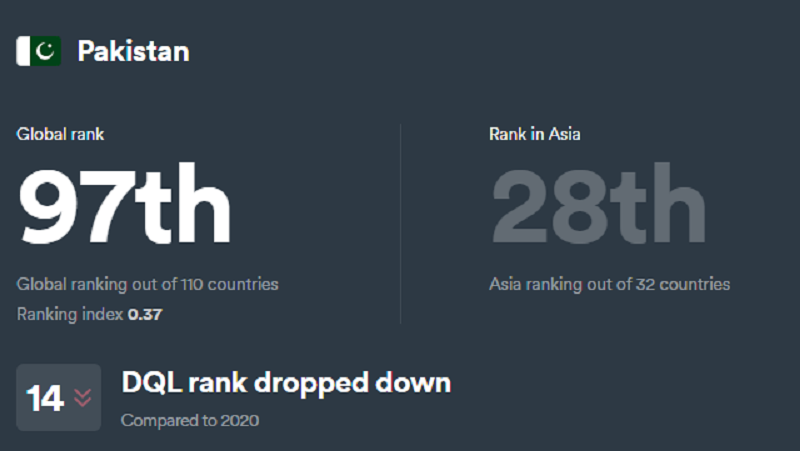Pakistan lagging behind India, Iran in 'Digital Quality of Life'
Pakistan ranks 97th among 110 countries in DQL 2021 index covering 90% of the global population

Pakistan was ranked among the worst countries in Digital Quality of Life (DQL) Index 2021, slipping 14 places since last year and standing at the 97th spot among 110 countries.
The DQL survey was conducted by cyber security company Surfshark which evaluates countries based on a set of five fundamental digital wellbeing pillars — internet affordability, internet quality, electronic infrastructure, electronic security and electronic government.
The study shows that Pakistan is lagging behind India and Iran in DQL but performing better than Bangladesh.
The third annual edition of the DQL ranks Pakistan 97th among 110 countries and covering 90% of the global population, according to an official statement.

Internet affordability and internet quality in Pakistan have been ranked at 66th and 74th on DQL Index, respectively.
However, out of 110 countries Pakistan stood at 106th spot in e-infrastructure, 98th in e-security and 85th in e-government.
Overall, Pakistan has demonstrated one of the most significant downfalls compared to DQL 2020, dropping from 83rd to 97th.
The study found that the country's internet affordability has decreased by 14% and is now around 50% worse than the global average.
The country ranks 66th for internet affordability and is surpassed by India and Iran. At the moment, people in Pakistan have to work more than four hours to afford the cheapest broadband package.
Nevertheless, Pakistan's internet quality is just slightly worse than the global average. It shows relatively good results with mobile and broadband internet speed growth – ranks 41st and 43rd, respectively. However, the country's broadband speeds are one of the slowest (10.33 Mbps) among all indexed countries.
The study shows that despite improving the e-security index by 132%, Pakistan still needs to work on its cyber security readiness.
The country ranks on the lower end of the pillar (98th) and is surpassed by most indexed countries. Also, Pakistan has one of the worst e-infrastructures worldwide. The country ranks 106th out of 110 countries, surpassed by Tajikistan, Cameroon, Angola, and Ethiopia.
“Digital opportunities have proved to be more important than ever during the Covid-19 crisis, stressing the importance for every country to ensure fully remote operational capacities for their economies,” explains Vytautas Kaziukonis, CEO of Surfshark.
“That is why, for the third year in a row, we continue the Digital Quality of Life research, which provides a robust global outlook into how countries excel digitally. The index sets the basis for meaningful discussions about how digital advancement impacts a country’s prosperity and where improvements can be made.”
Europe leading DQL Index
In an all-around picture, six out of 10 countries holding the highest scores are located in Europe, following last year’s trend. Denmark has been ranked 1st in DQL for the second year in a row and is closely followed by South Korea.
Which country has the best digital quality of life in 2021? 🎉 #DQL2021 #dql pic.twitter.com/hgb7CXVnSA
— Surfshark (@surfshark) October 6, 2021
Finland was ranked 3rd, while Israel and the US round out the top five of 110 nations that were evaluated. The bottom five countries are Ethiopia, Cambodia, Cameroon, Guatemala, and Angola.
Regionally, the US stands out as a country with the highest digital quality of life in the Americas, while South Korea takes the leading position in Asia. Among countries in Africa, people in South Africa enjoy the highest quality of their digital lives whereas Australia leads in Oceania, outperforming New Zealand in various digital areas.
Internet affordability
Broadband is globally less affordable this year.
Comparing countries included in both DQL20 and DQL21, people have to work 11% more (25 min more) to afford broadband internet in 2021. However, people have to work 29% less (28 min less) to afford mobile internet this year.
The world’s worst internet is the least affordable. People in some countries, such as Nigeria, Côte D'Ivoire and Mali require approximately a week’s worth of work to afford the internet.
Investing in electronic infrastructure and electronic government contributes to people’s digital wellbeing the most.
The 2021 DQL research examined a total population of more than 6.9 billion people in terms of five core pillars and 14 underpinning indicators that provide a comprehensive measure. The study is based on open-source information provided by the United Nations, the World Bank, Freedom House, the International Communications Union, and other sources.
The full 2021 Digital Quality of Life report and an interactive country comparison tool can be found here: https://www.surfshark.com/dql2021.



















COMMENTS
Comments are moderated and generally will be posted if they are on-topic and not abusive.
For more information, please see our Comments FAQ